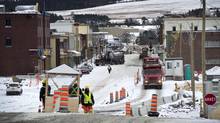One month before the disaster in Lac-Mégantic, Que., a New Brunswick refinery raised concerns about a lack of testing on crude oil that is shipped by rail.
In a presentation to industry obtained by The Globe and Mail, an Irving Oil employee said there is an overreliance on testing at the refinery, once the crude has already been delivered, to determine the content. That testing comes “too late in the process to address any safety issues,” says the presentation, which was prepared for a Crude Oil Quality Association conference in Seattle.
MORE RELATED TO THIS STORY
Highlights from Irving Oil's presentation on crude oil issues
Lac-Mégantic has a reluctant rebirth as first trains roll through town
Rail service to resume in Lac-Mégantic after fatal derailment
A locomotive passes on the tracks through Lac Megantic, December 18, 2013.
MULTIMEDIA
Highlights from Irving Oil's presentation on crude oil issues
MULTIMEDIA
Last moments of Lac-Mégantic: Survivors share their stories
INVESTIGATION
Video: From the U.S. to Lac-Mégantic: Inside the massive growth of oil by rail
VIDEO
Video: First train since disaster rolls through Lac-Mégantic
Worries about the composition of oil drawn from the Bakken formation have grown after a train carrying the crude derailed in Lac-Mégantic, setting off a series of fierce explosions not normally associated with crude oil.
The presentation – titled “Crude by Rail Quality Issues” and prepared by Gary Weimer, quality assurance and control manager at Irving’s refinery in Saint John – said the company was encountering tank cars that contained “sludge” and “contaminants,” while some cars had “unknown substances.”
The slide show is dated June 6, one month before the Lac-Mégantic tragedy: On July 6, a train carrying 72 cars of crude oil from North Dakota that was destined for Irving’s refinery in Saint John exploded in the heart of the town, killing 47 people.
Irving’s refinery is one of several in North America that process oil from the Bakken fields, which straddle North Dakota and parts of Manitoba and Saskatchewan. The oil is now being investigated by Canada’s Transportation Safety Board to determine why it caused such massive explosions, which investigators said were uncharacteristic of typical crude oil.
The Irving Oil document is one of several dozen exhibits that make up a class-action lawsuit filed on behalf of the victims of the Lac-Mégantic disaster. The suit alleges Montreal, Maine & Atlantic Railway, Canadian Pacific Railway and a host of other companies, including Irving Oil and fuel broker World Fuel Services, are liable for unsafely shipping the oil that exploded on July 6. None of the allegations have been proven in court.
The suit is being led by several survivors of the Lac-Mégantic accident, along with Toronto law firm Rochon Genova LLP, and is awaiting certification.
According to the presentation, Irving also had concerns with oil from various sources being mixed in tank cars, making it difficult to pinpoint the makeup of the crude being shipped.
“Samples are not from a homogenous mixture,” the documents say. “Rail cars after 5-7 days delivery time have begun layering; water and sediment on bottom; light products on top.”
Irving raised oil testing concerns a month before Lac-Mégantic tragedy






















Laissez un commentaire Votre adresse courriel ne sera pas publiée.
Veuillez vous connecter afin de laisser un commentaire.
Aucun commentaire trouvé